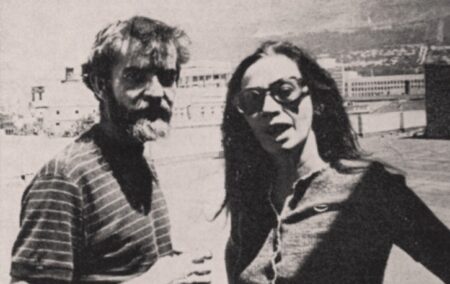Renowned South African playwright, actor and director Athol Fugard, who died in Stellenbosch at the weekend, is remembered in tributes as a giant of the theatre and one of the most significant playwrights of the English-speaking world of the late 20th century.
He was celebrated in South Africa and abroad for hard-hitting dramas that ranged from Blood Knot (1961), Boesman and Lena (1969), Sizwe Banzi is Dead (1972), and The Island (1972) to Master Harold … and the Boys (1982), The Road to Mecca (1984) and the more recent Sorrows And Rejoicing (2001), and The Train Driver (2010).
Harold Athol Lanigan Fugard was born in June 1932 in Middelburg in the Eastern Cape, and rose to become a dramatist of international renown, being named the greatest active playwright in the English-speaking world by Time magazine in 1989.
Daily Maverick recalls that his citation for the Order of Ikhamanga stated: “He became increasingly aware of apartheid’s injustice. This was to become the background to most of his work, although he has never been merely a polemicist but is, rather, a keen observer of people and their problems with society. Fugard, who is often compared with Tennessee Williams, once said that in his own case, his ‘real territory as a dramatist is the world of secrets with their powerful effect on human behaviour and the trauma of their revelation.”.
In a tribute yesterday, his friend and long-time collaborator John Kani said on X: “I am deeply saddened by the passing of my dear friend Athol Fugard. May his soul rest in eternal peace. Elder.”
TimesLIVE reports that the Centre for Creative Arts at the University of KwaZulu-Natal commended “his incredible contribution to South African theatre,” adding: “His plays will be a lasting legacy for generations of South Africans.”
Khwerha Ye Afrika Projects said Fugard’s departure leaves an irreplaceable void in the world of theatre.
News24 reports that Western Cape Premier Alan Winde said: “His penetrating, sharp wit has left an indelible mark on our shared cultural heritage, and his acute understanding of our country’s political and cultural make-up is unmatched. He will be sorely missed.”
The office of Cape Town mayor Geordin Hill-Lewis said in a statement: “Athol Fugard was not just a luminary in the world of theatre; he was a teller of profound stories of hope and resilience about South Africa.”
Writing in The Guardian, Mark Lawson observes: “The end of apartheid and Mandela’s presidency removed, from 1994, what the novelist Nadine Gordimer had called ‘the only subject’ for white liberal writers in South Africa. Fugard, though, wrote plays that effectively reflected the country’s ‘truth and reconciliation’ phase of attempted restorative justice.
“In The Train Driver (2010), his strongest late work, the white title character seeks out the family of a black mother and child who died when they stepped in front of his train; in Sorrows And Rejoicing (2001), the family of a dead, white anti-apartheid writer reflect on the evasions of his life.
“That Fugard continued as a dramatist even when the driving cause of his first plays was achieved was due to the incompleteness of the victory. Whereas anti-Soviet dramas now have only historical interest – as relative democracy has continued in Russia’s former bloc – the 2021 revival of Fugard’s Statements After an Arrest Under the Immorality Act, at the Orange Tree theatre in Richmond, remained disconcertingly relevant.
“While the specific evil it dramatised – the ban on interracial sex in South Africa from 1927 to 1985 – was gone, the play now served a new purpose: a metaphor for the continuing inequalities of opportunity and security suffered by people of colour around the world.”
[Image: Athol Fugard and actress Yvonne Bryceland, Standard Encyclopaedia of Southern Africa]


